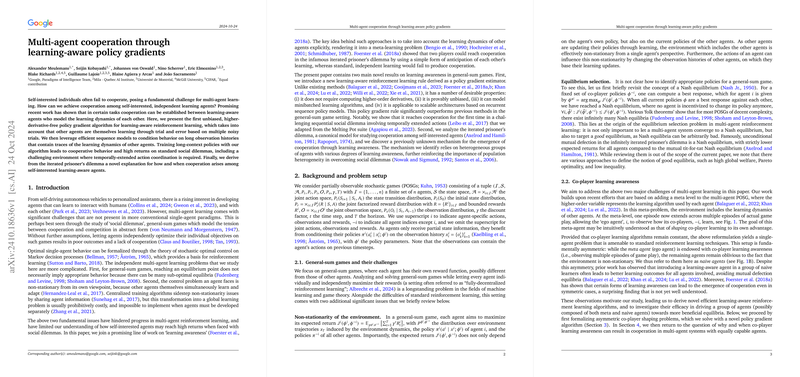Multi-Agent Cooperation Through Learning-Aware Policy Gradients: A Comprehensive Analysis
The paper "Multi-Agent Cooperation Through Learning-Aware Policy Gradients" addresses the fundamental challenge of achieving cooperation among self-interested agents in multi-agent systems. It introduces a new policy gradient algorithm that does not rely on higher-order derivatives and is designed for learning-aware reinforcement learning. This approach accounts for the learning dynamics of other agents, who adapt based on trial and error over multiple noisy trials.
Key Contributions
- Algorithmic Development: The proposed policy gradient rule, known as COALA-PG, is the first unbiased approach that facilitates cooperation among agents. It efficiently processes long observation histories using sequence models, enhancing the agents' ability to infer co-player learning dynamics.
- Empirical Validation: The algorithm demonstrates significant cooperative behavior and achieves high returns in environments characterized by social dilemmas. The paper includes a complex sequential social dilemma that requires temporally extended action coordination.
- Theoretical Insights: A novel mechanism for cooperation emergence is derived from the iterated prisoner's dilemma, emphasizing the importance of heterogeneity among agents in overcoming social dilemmas.
Numerical Results and Analysis
The COALA-PG algorithm significantly outperforms previous methods in standard environments and exhibits robust cooperation even in mixed groups of learning-aware and naive agents. When these agents face social dilemmas, their cooperation is particularly notable in achieving higher returns compared to baselines.
- In experiments with the iterated prisoner's dilemma, learning-aware agents driven by COALA-PG transition from extortion strategies against naive learners to cooperative strategies when matched with other learning-aware agents. Such transitions highlight the algorithm's ability to adapt strategy based on observed learning behaviors.
- Within the mixed-group setup containing both naive and learning-aware agents, COALA-PG agents successfully navigate to higher return equilibria, thereby illustrating its effectiveness in dynamic and non-stationary environments.
Implications and Future Directions
The findings have both practical and theoretical implications for how autonomously learning agents can achieve cooperation in competitive contexts. Practically, this could improve the design of decentralized systems like autonomous vehicle networks or trading agents. Theoretically, it sheds light on the role of agent heterogeneity in facilitating cooperative equilibria.
Future research could explore scaling these techniques with larger models and more complex environments, leveraging advanced architectural innovations such as transformers. This involves adapting COALA-PG for broader contexts within AI where cooperation can optimize system-wide outcomes.
Conclusion
The introduction of COALA-PG offers a scalable approach to multi-agent cooperation, addressing long-standing challenges in non-stationary environments through learning awareness. The connections drawn between mathematical modeling and empirical results establish a cornerstone for subsequent algorithmic advancements and cooperative system designs.
